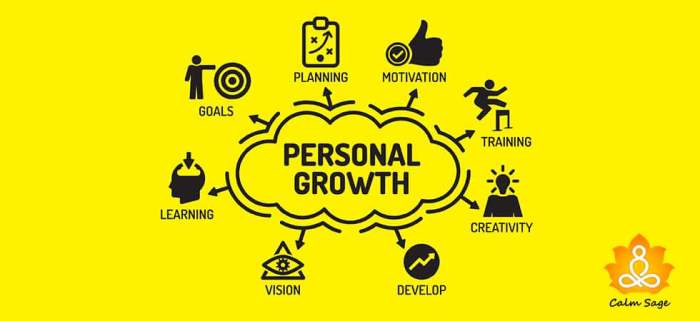Kicking off with Self-Improvement Tips, this opening paragraph is designed to captivate and engage the readers, setting the tone american high school hip style that unfolds with each word.
Ready to level up your life? Dive into these self-improvement tips that will have you crushing goals and feeling like a boss in no time. From setting killer goals to cultivating healthy habits, get ready to transform into the best version of yourself.
Importance of Self-Improvement
Self-improvement plays a crucial role in personal growth and development. By actively working on improving ourselves, we can enhance various aspects of our lives and ultimately reach our full potential.
Enhanced Personal Growth
Self-improvement allows individuals to continuously learn, grow, and evolve. By setting goals, acquiring new skills, and challenging ourselves, we can expand our knowledge and capabilities, leading to a more fulfilling and enriching life.
Improved Relationships
When we focus on self-improvement, we become more self-aware and empathetic, which can positively impact our relationships with others. By working on our communication skills, emotional intelligence, and interpersonal dynamics, we can foster healthier and more meaningful connections with those around us.
Increased Confidence and Motivation
Engaging in self-improvement activities can boost our confidence and self-esteem. As we achieve our goals and overcome challenges, we gain a sense of accomplishment and pride, fueling our motivation to continue growing and striving for excellence in all areas of our lives.
Setting Personal Goals

Setting personal goals is crucial for self-improvement as it gives direction and focus to your efforts. By establishing specific and achievable goals, you can track your progress and stay motivated on your journey towards self-improvement.
Tips for Setting SMART Goals
- Specific: Clearly define what you want to achieve. For example, instead of saying “I want to get fit,” you can set a specific goal like “I want to run a 5k in under 30 minutes.”
- Measurable: Make sure your goals are measurable so you can track your progress. You can measure your progress by keeping a journal, using a fitness tracker, or setting milestones along the way.
- Achievable: Set goals that are within reach and realistic for you. It’s important to challenge yourself, but setting unattainable goals can lead to frustration and disappointment.
- Relevant: Your goals should align with your values and long-term objectives. Make sure they are meaningful to you and contribute to your overall growth and well-being.
- Time-bound: Set a deadline for achieving your goals to create a sense of urgency and focus. This will help you stay on track and avoid procrastination.
Importance of Tracking Progress
Tracking your progress towards your goals is essential for self-improvement as it allows you to see how far you’ve come and what areas may need adjustment. By monitoring your progress, you can celebrate small victories, identify obstacles, and make necessary changes to reach your goals effectively.
Developing Healthy Habits
Developing healthy habits is essential for overall self-improvement as it plays a significant role in enhancing mental, emotional, and physical well-being. Consistency in maintaining these habits is crucial for long-term success and positive outcomes.
Examples of Healthy Habits
- Eating a balanced diet rich in fruits, vegetables, and whole grains.
- Regular exercise routine to stay active and maintain physical fitness.
- Getting an adequate amount of sleep each night for rest and rejuvenation.
- Practicing mindfulness or meditation to reduce stress and improve mental clarity.
- Hydrating your body by drinking enough water throughout the day.
Importance of Consistency
Consistency is key when it comes to developing and maintaining healthy habits. By sticking to a routine and making these habits a part of your daily life, you are more likely to see positive changes and improvements in your overall well-being.
Positive Impact on Well-being, Self-Improvement Tips
Healthy habits can have a profound impact on your mental, emotional, and physical health. Eating nutritious foods, staying active, and taking care of your mind and body can boost your mood, increase energy levels, and reduce the risk of chronic diseases.
Mindfulness and Self-Reflection
Mindfulness and self-reflection play crucial roles in the journey of self-improvement. By being present in the moment and reflecting on our thoughts, emotions, and actions, we can gain a better understanding of ourselves and make positive changes in our lives.
Practicing Mindfulness
- Start your day with a few minutes of mindful breathing or meditation to set a positive tone for the day.
- Practice being fully present in whatever you are doing, whether it’s eating, walking, or talking to someone.
- Avoid multitasking and focus on one task at a time, giving it your full attention.
- Use mindfulness apps or guided meditation sessions to help you stay on track with your practice.
Techniques for Self-Reflection
- Journaling your thoughts and feelings regularly can help you gain insights into your patterns and behaviors.
- Set aside time each day to reflect on your actions, reactions, and decisions, and consider how they align with your values and goals.
- Seek feedback from trusted friends or mentors to gain different perspectives on your strengths and areas for growth.
- Practice self-compassion and non-judgmental awareness during self-reflection to foster a positive mindset.
Personal Growth and Decision-Making
Self-reflection can lead to personal growth by helping you identify areas for improvement and make necessary changes. By understanding your thoughts and behaviors more deeply, you can make more informed decisions that align with your goals and values. This process of self-awareness and reflection can ultimately lead to greater self-acceptance and overall well-being.
Time Management Strategies: Self-Improvement Tips
In the journey of self-improvement, effective time management is crucial to balance personal growth activities with daily responsibilities. By implementing the right strategies, individuals can optimize their time and make significant progress towards their goals.
Setting Priorities
One of the key time management strategies for self-improvement is setting priorities. Identify the most important tasks that will contribute to your growth and tackle them first. Use tools like to-do lists or apps to keep track of your priorities.
Avoiding Procrastination
Avoiding procrastination is essential in the pursuit of self-improvement. Break down your tasks into smaller, manageable steps and set deadlines for each. By taking consistent action and avoiding delays, you can stay on track towards your personal development goals.
Creating a Schedule
Creating a schedule or routine is another effective time management strategy for self-improvement. Allocate specific time blocks in your day dedicated to activities that promote growth, such as reading, exercise, or learning new skills. By structuring your day, you can ensure that you make time for self-improvement amidst your other commitments.
Seeking Continuous Learning

Seeking continuous learning is essential for ongoing self-improvement as it allows individuals to expand their knowledge, acquire new skills, and stay relevant in a rapidly changing world. Embracing a mindset of lifelong learning fosters personal growth and development, opening up opportunities for advancement and success.
Resources for Continuous Learning
- Books: Reading books on various subjects can provide valuable insights and perspectives, helping individuals broaden their understanding and expertise.
- Courses: Enrolling in online courses or attending workshops can offer structured learning experiences and opportunities to acquire specific skills or knowledge.
- Mentorship: Seeking guidance from experienced mentors or experts in a particular field can provide valuable advice, feedback, and support for personal growth.
Methods for Continuous Learning
- Set Learning Goals: Establishing clear objectives for learning can help individuals stay focused and motivated to acquire new knowledge and skills.
- Practice Regularly: Consistent practice and application of newly acquired knowledge or skills are crucial for retention and mastery.
- Seek Feedback: Receiving feedback from peers, mentors, or instructors can help individuals identify areas for improvement and refine their learning strategies.
